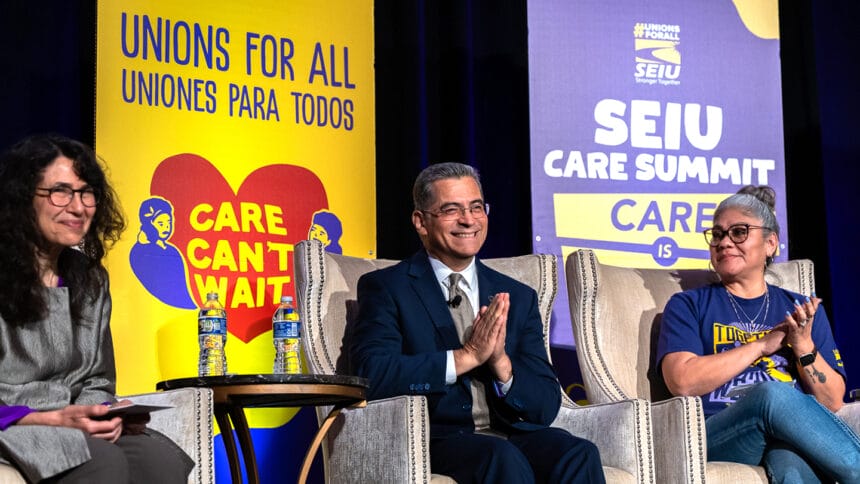
A national union on Friday skewed comments made by Health and Human Services Secretary Xavier Becerra to imply federal regulators had proposed an 80% direct care spending requirement for the nursing home sector.
Speaking at the SEIU Care Champions Summit Thursday, Becerra called for additional accountability measures to ensure direct care workers see more of the money the government is spending in caregiving fields.
“We want 80% of the money we send out to be dedicated to the workforce for wages and benefits,” Becerra said in response to a roundtable question from the owner of a childcare business.
“You have a business so you have overhead and you have other costs, but we’re saying the business of care requires people, and if you’re going to have overhead expenses, most of it’s going to be to pay wages to the people doing the business.”
Refocusing toward nursing homes
In an interpretation of the event shared Friday by a communications firm on behalf of union representatives, Becerra’s remarks were edited to state that he was talking about the nursing home staffing mandate proposed in September:
“We want 80% of the money we sent out [to nursing homes] to be dedicated to the workforce for wages and benefits,” read a recap of the event sent out by PR firm Berlin Rosen.
The staffing mandate would impose new cost reporting requirements but stopped short of proposing a minimum spending threshold.
“We were very intentional,” about creating an 80% threshold, Becerra went on to say in a video from the event posted Thursday. In fact, the Centers for Medicare and Medicaid Services in April did propose that 80% of Medicaid payments for personal care, homemaker and home health aide services be spent on compensation for direct care workers.
SIEU and other unions have brazenly boasted about their influence over nursing home policy setting in the Biden administration, and the admiration appears to be mutual. Earlier this fall, Becerra told a union rally that staffing regulations advanced to the formal proposal “because so many of you made the demand, quite honestly, the push to make sure that we establish real standards.”
SEIU national Vice President Leslie Frane made clear the union would like to see the administration further expand its spending requirements.
“This concept of putting strings on taxpayer dollars … seems like common sense to us,” she told Becerra.
The meeting in Washington, DC, was attended by SEIU national and state leaders, as well as about 200 audience rank-and-file members.
In an email Friday, a spokesperson for the HHS Office of the Secretary confirmed that Becerra cited the proposed regulation “to ensure the lion’s share of a Medicaid dollar for Home and Community-Based Services goes to pay the compensation of our care workforce. And we’re asking states to be transparent about how much they are paying.”
Staffing rule comments
On the nursing home side, Becerra touted the minimum staffing rule’s strong comment response from frontline workers, families and union representatives. He called for continued support for the rule, which received nearly 47,000 total comments, against strong headwinds.
“If you’re going to be a nursing home, you better have some nurses in your operation,” Becerra said. “If you are going to charge for that care, then give quality, and if you’re going to go out there and profess to people, to represent to people that you will safely and with care provide services to those people who are residents, then we have an obligation as our government to hold you accountable.”
Becerra said some of the comments received “may lead us to make some changes to improve the way we enforce the standards to make sure that we’re covering all the bases.”
“We hope that we can finalize that rule with your support and then get to it,” he added.
Editor’s note: The union explained in an email after this story was published “that the attempt to provide clarity should not have singled-out nursing homes, and reiterated the Biden Administration and Secretary Becerra’s strong support for care workers across industries including nursing homes, home care and child care.“



